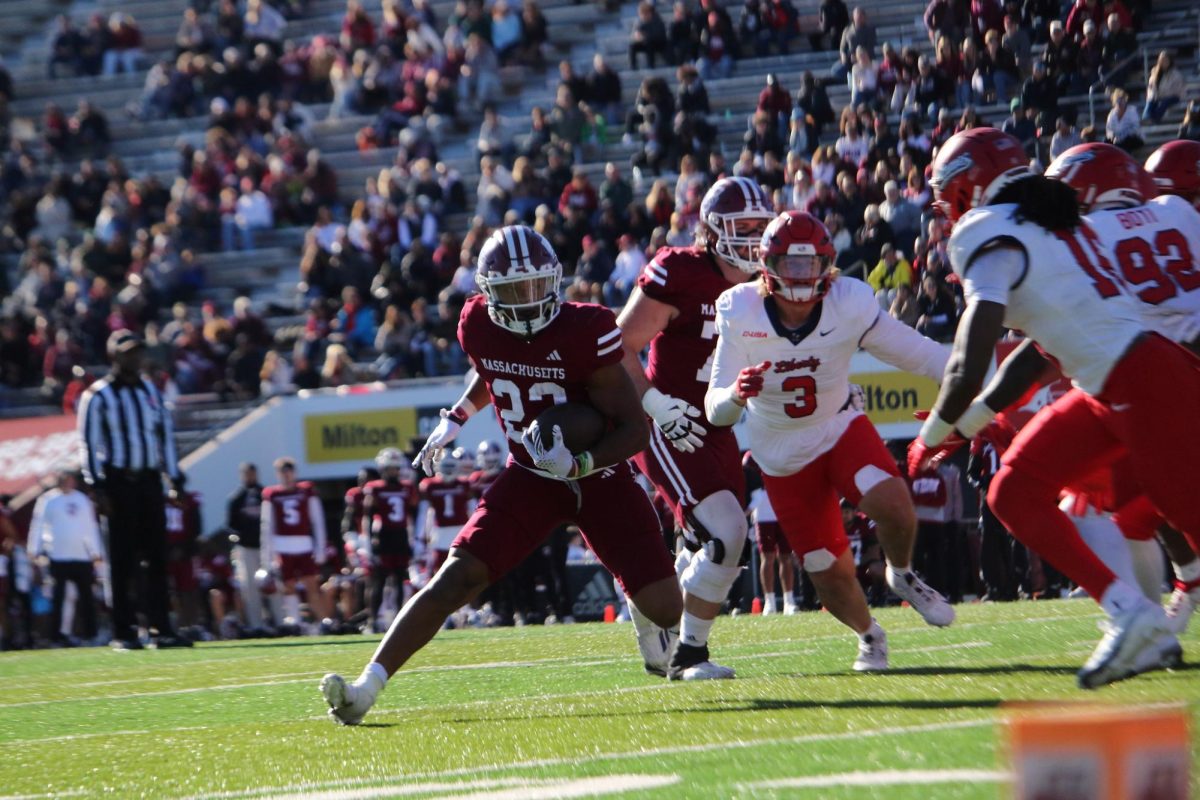 On a night filled with spirited dialogue, one voice was noticeably absent from the League of Women Voters senate candidate forum held Sunday in Bowker Auditorium on the campus of the University of Massachusetts.
On a night filled with spirited dialogue, one voice was noticeably absent from the League of Women Voters senate candidate forum held Sunday in Bowker Auditorium on the campus of the University of Massachusetts.
Massachusetts Attorney General Martha Coakley, often called the frontrunner in the special election race to fill the senate seat left vacant by the late Sen. Ted Kennedy, was the only candidate who did not appear at last night’s forum, and the rest of the candidates appeared to take note.
City Year founder and Democratic candidate Alan Khazei several times took aim at Coakley, calling for weekly televised debates leading up to the Democratic primary Dec. 8 and suggesting her refusal to debate could be because of her connections to lobbying interests.
Khazei was not the only one who called for more discourse. Recent entry to the race and Republican dark horse candidate Jack E. Robinson called for a Republican-only forum, criticizing opponent Scott Brown for refusing to debate him individually.
The forum, hosted by the Massachusetts League of Women Voters and in cooperation with Amherst National Public Radio affiliate WFCR, was marked by a civil tone, as the candidates took no serious personal jabs at each other beyond policy challenges.
The event was moderated by Bob Paquette, host of WFCR’s Morning Edition program. Before the dialogue began, UMass Chancellor Robert Holub and President of the Massachusetts League of Women Voters Zoxaro Bennett gave opening remarks.
The candidates were seated alphabetically by party, with State Sen. and Republican candidate Scott Brown to the far right, his opponent, Jack E. Robinson, to the left, Democratic Congressman Michael Capuano in the middle, Alan Khazei beside him and venture capitalist, Celtics co-owner and Democratic candidate Steve Pagliuca to the far left.
The candidates were given two minutes each to answer questions, followed by two rounds of one-minute rebuttals before shifting subjects. Before turning the floor over to the candidates, Paquette stressed that there were to be no personal attacks and that the audience should hold its applause until the end.
From there, Paquette moved to what everyone had been waiting for, the substance of the forum, beginning by asking the candidates their thoughts on the federal government’s role in the economy.
Pagliuca was the first to give his take, stating that “first, we need strong regulations.” He said that Massachusetts’ current number of unemployed citizens, 320,000, “resulted from a lack of regulation,” citing his experience in the business world as evidencing his knowledge that people will cut corners when they are left unregulated.
Pagliuca furthered that regulation “needs to be principles-based,” adding that allowing non-banking institutions to give loans, part of what contributed to America’s subprime mortgage crisis, allowed businesses to offer poor deals to uninformed consumers without being stopped. He said he would create a consumer financial protection agency, and that “this whole situation should have already been fixed.”
From there, Republican candidate Scott Brown took the floor.
Brown said that, with America’s bailout package, its citizens are now its business partners, and thus have a stake in America’s dealings.
“U.S. citizens now have a say in how they are going to compensate executives,” he said, continuing to say that he believes, given America’s current trade deficit and national debt, it should be cutting spending rather than expanding it.”
“We just passed the stimulus,” he said. “We should reduce taxes, that will stimulate economic activity.”
“We need lower taxes so people have more money in their pockets,” he continued.
Longtime Republican candidate Jack E. Robinson was next to weigh in. He blamed America’s financial problems on the Federal Reserve making too many funds available without keeping track of where they ended up.
“The problem has been the Federal Reserve,” he said, “the Fed opened the floodgates, we had a credit bubble and the granddaddy of them all, the housing bubble. We need to audit the Fed and find out where did this money go,” he continued. Robinson suggested creating an oversight committee to track the Federal Reserve’s spending.
From there, the floor passed to Congressman Michael Capuano, possibly the candidate at the forum with the most public support.
Capuano also blamed America’s economic woes on lack of regulation.
“The problem,” he said, “is lack of regulation that has been going on for 20, 30 years.” Capuano blamed a lack of transparency for America’s ails, and said that he is “committed to regulating industry.” He said he would work to protect the unemployed and to create and save jobs, citing saving jobs as equally important to creating them. Lastly, Capuano said that, in terms of job creation, “I don’t think the stimulus was big enough.”
Civic organizer and charity founder Alan Khazei then had his turn, stating that his career in public service has shown him how and where citizens are negatively impacted by the current set of issues facing America.
“I want to be the jobs senator,” he said. “We need jobs in this state and I want to create jobs.”
Khazei proposed what he called a “hiring tax credit,” which would give businesses tax breaks for hiring more employees. He said the plan could create up to 100,000 jobs in Massachusetts. Khazei also proposed a write-off plan, allowing businesses to deduct investments in the infrastructure of their business such as materials, tools and manpower, up to $50,000 a year, freeing up that money for more investment, and called for “a revolution in clean energy and green jobs.”
From there, the candidates moved to rebutting each others’ arguments. Brown honed in on Capuano, arguing that “we don’t need a second stimulus, we need targeted tax breaks.” He said that predatory lending practices had hurt America’s borrowers, but that regulation was not the answer and that “sometimes government needs to know when to step out of the way.”
Robinson, to some extent, echoed Brown’s take, claiming that “the stimulus only stimulated the government, not small businesses, which is the way to create.” He also called for targeted tax cuts, essentially lowering taxes on certain brackets of people, and said he supported eliminating the capital gains tax.
Khazei then gave his input, arguing that the Student Accountability and Financial Responsibility Act (SAFRA) was a promising solution, saying that it will save $90 billion by keeping student loan costs fixed, rather than allowing banks to profit on higher education. That money, he argued, could be used to fund research, scholarships, grants and to improve quality of education nationally.
Pagliuca continued to underscore the significance of the stimulus, saying that it gives money back to the people and that stimulus money should be used to catalyze small businesses, while Capuano held that the stimulus is imperfect but at least progress, emphasizing his message of compromise to create change.
Pagliuca also called for increasing Pell grants to help students fund college, and argued that “if we can’t reform finance and healthcare, we won’t create jobs,” continuing to suggest that “we need to invest in bio and clean technology to keep people in the state.”
Brown, for his part, held that Massachusetts’ administration was not using its stimulus money well, repeating that the Commonwealth is number 49 in using its stimulus money.
The topic then shifted to the environment, with the candidates asked their thoughts on an international treaty on climate change and the US’s role in helping developing nations build their economies while helping the environment.
Capuano was first, stating that “the federal government should be recreating the economy along green energy lines,” calling green energy “the leading technology of the day.”
Capuano said that Massachusetts “understands entrepreneurial research,” and that, because of that, it will be a leader in developing the green energy industry.
He called for a treaty “along the lines of Kyoto,” and renewed a push to develop the long dormant Cape Wind project to build a wind farm off Cape Cod.
Khazei said that he would vote for a climate change treaty immediately, and that he believes the energy lobby is curbing the fight to stop climate change.
“The reason this bill is stopped in the Senate is because of the energy lobby,” he said, “and I’m not taking that money.”
Khazei advocated for a combination package of solar, wind and biofuel technologies and said he would like to see a collaboration between research institutions like universities, private energy companies and politicians to develop green energy strategies. He likened the situation to the one that created the National Institute of Health, and said he would move to start “a clean energy NIH.”
Pagliuca called the green energy push “a win-win situation,” targeting a 15-year timetable for reducing carbon emissions. He said he believes Massachusetts can reduce carbon by 50 percent by 2025, and that he supports the Copenhagen climate treaty. He said he supports a cap and trade system, noting that it has worked to curb emissions and increase green energy production in Europe.
Brown suggested a “total approach to conservation,” but also underscored the economics involved, saying that Massachusetts’ taxes are too high to keep businesses in state with tighter regulations or more taxes for emissions. He decried the cap and trade proposal currently in place, where organizations are taxed by the amount of their emissions, saying that can only make Massachusetts less economically competitive, and suggested lowering corporate taxes. He said the cap and trade tax will cost families approximately $1,700 a year, and that he feels “that is not good for businesses and not good for families.”
Robinson shared Brown’s economic concerns, saying that “the environment shouldn’t ruin the economy,” and suggested increased nuclear power as a viable route for reducing energy costs and emissions. The Martha’s Vineyard native also said he supports the Cape Wind project. He proposed implementing a system where, for every ton of pollutants a business produces, it must invest four tons in other businesses dedicated to reducing pollution.
The next topic was war and peace, with the candidates asked their thoughts on America’s continuing role in Afghanistan and Pakistan as well as their stance on the America’s place as a humanitarian nation.
Robinson kicked off the segment, stating that “Afghanistan is not Charlie Wilson’s war.” He called for a serious examination of “what is our mission,” positing that “the mission should be, ‘what is our mission?’” He called for stabilizing Pakistan, increasing civilian aid to Pakistan to bolster the legitimacy of its government and working on improving women and children’s rights.
Capuano reiterated his anti-war sentiments, stating that he believes America’s mission in Afghanistan is largely over and re-emphasizing that he had voted against the war in Iraq. “
“I will not vote for more troops in Afghanistan because our mission has been completed,” he said. “The Taliban and Al Qaeda are no longer really in Afghanistan,” he said, arguing that the effort to expel them had been successful. “We need to support the Pakistani government and chase Al Qaeda around the world,” he said.
Khazei said he does not support more troops in Afghanistan and that he favors “a comprehensive foreign policy strategy.” He cited the fact that Afghanistan had been a defeat for many superpowers, from the British to the Soviets, and that he would prefer infrastructural rather than military aid, calling for “more roads, schools, democratic support,” as well as working to rid the world of nuclear weapons.
Pagliuca, for his part, called for removing troops as soon as possible, stating that “since World War II, we have not been successful at nation building.” He said he supports a counterterrorism strategy, fighting battles where they are against terror groups, as opposed to engaging in long term wars.
Brown called himself “the only one running with military experience,” and his opinion essentially reflected this. He favored listening to the opinions of Generals Stanley McChrystal and David Petraeus, stressing that “we need to finish the job or we will be back there in 10, 15 years doing it again.” He criticized President Barack Obama for taking too long to decide his course of action and said that military personnel felt undercut by the president and Congress not giving the military what he called the tools it needs to win.
Around 8:35, Congressman Capuano abruptly left the forum, which his press secretary, Roger Lau, attributed to his being extremely tired upon touring Western Massachusetts after a trip to Washington.
Khazei called for micro-lending programs in the Middle East to bolster economic activity and empower poor citizens, while Pagliuca called for a nuclear test ban treaty in his rebuttal.
Robinson called for strengthening Israel to safeguard it from attack as the topic of a nuclear Iran became a point of focal discussion.
Brown pressed for working with China and Russia to build sanctions against Iran, while Robinson felt that those two states would not work with America and Khazei and Pagliuca advocated for abandoning nuclear weapons.
Lastly, the topic shifted to the federal government’s role in the health care debate.
Brown said Massachusetts’ current health care plan is one of the best ever devised, praising the bill he helped to pass and saying that any national public option would only force Bay State residents to pay for other peoples’ care.
“The government option will directly compete with insurance companies and will cost people jobs,” he said. “If you have good coverage, it will be taxed,” he continued, suggesting that the government might even jail those who do not buy a public plan.
Robinson called for a “mini-public option,” endorsing a plan to give people emergency room care and a prescription card, which he said would cut costs from a full-scale public insurance plan.
Khazei said healthcare is a “personal issue for me,” and that he believes in universal health care. He said he favors taxing so-called “Cadillac plans,” essentially, premium packages that some can afford to buy, and using that revenue to fund the proposed public option.
He said America needs a public option to drive competition. Otherwise people will be forced to buy private plans and simply drive insurance companies’ profits.
Brown responded that a public plan is not good for Massachusetts, with Robinson countering that Massachusetts plan forces people to buy coverage but does not lower costs.
Pagliuca called the health care bill “great,” and said that America must work to contain administrative costs, work on tort reform, curtailing malpractice suits in this case, promote what he called best practice sharing, or evening costs across the country for the same treatment and increasing transparency, arguing that cases should be treated episodically rather than on the whole.
At 9:12, the candidates gave their closing statements, with each allotted two minutes. Before the crowd dispersed through the Bowker’s thick wood doors, many engaged in passionate discussion about who had been most persuasive and who of the candidates they would be backing this January 19.
Sam Butterfield can be reached at [email protected].







The Red Curry Expert • Sep 15, 2010 at 7:55 pm
Am I alone in saying that this doesn’t entirely make sense? How come I’m the only one wondering if this is a big joke.
Chris Kerr • Nov 9, 2009 at 9:51 am
Bravo! What a terrific, balanced but engaging summary of the evening. Thank you, Mr. Butterfield.